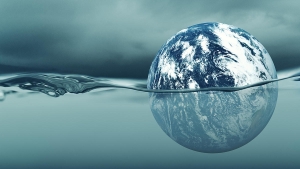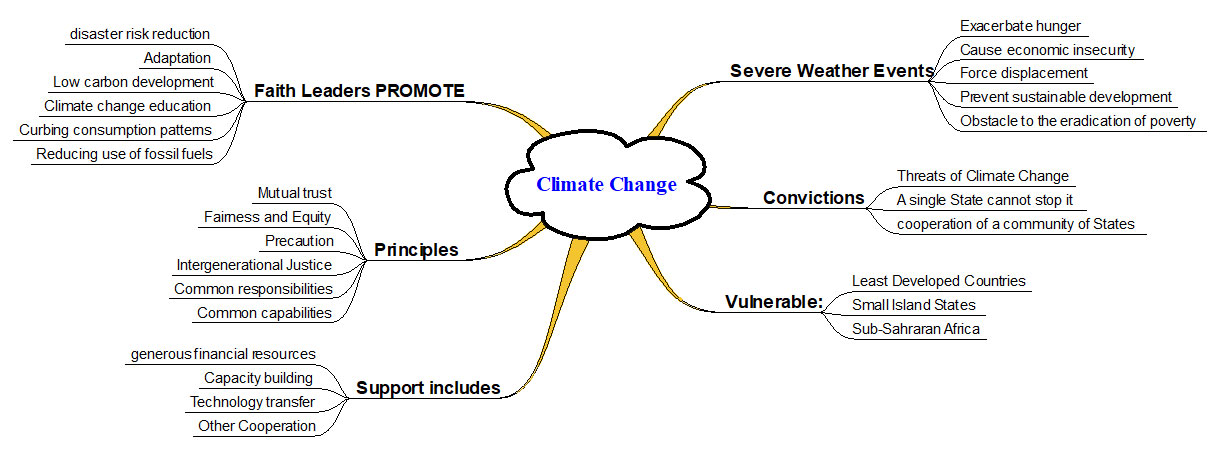 Interfaith activity is where believers of different faiths come together to build harmony, cooperation and understanding. This can happen at the neighbourhood level, at the state level, or at a national level, and, in the case of Climate Change, there are international interfaith responses.
Interfaith activity is where believers of different faiths come together to build harmony, cooperation and understanding. This can happen at the neighbourhood level, at the state level, or at a national level, and, in the case of Climate Change, there are international interfaith responses.
The direct effects of climate change are
- storms
- drought
- flood
- heatwave
The indirect effects of climate change are (among others)
- water quality
- air pollution
- land use change
- ecological change
The impact severe weather events on the human person are (among others)
- Health
- mental illness
- undernutrition
- allergies
- cardiovascular diseases
- infectious diseases
- injuries
- respiratory diseases
- poisoning
Interfaith Response
One interfaith Response was to make a strong statement to the United Nations Framework Convention on Climate Change (UNFCCC) of the Paris Conference of Parties (COP 21) 30 Nov 2015 – 11 Dec 2015. There was an Interfaith Summit in New York 2014 organized by the World Council of Churches and Religions for Peace. Thereafter, a statement was prepared, and there were Faith Pilgrimages to the Paris Climate Change Conference which delivered the statement.
The climate pilgrims included Catholics, Buddhists, Muslims, Hindus and Protestants — representing the world`s major religions and their call for action to save the Earth from the devastating effects of climate change.
The petition signed by 1,780,528 citizens worldwide was given to Christiana Figueres, in charge of climate issues at the United Nations, along with Nicolas Hulot, French President Francois Hollande`s special envoy for the planet.
Statement Summary
The Interfaith Statement on Climate change acknowledges that acknowledge the overwhelming scientific evidence that climate change is human-induced. Severe weather events exacerbate hunger, cause economic insecurity, force displacement of peoples, prevent sustainable development and create obstacles to the eradication of poverty.
The Interfaith leaders shared that the most vulnerable nations are Least Developed Countries, Small Island States and Sub-Saharan Africa. Climate change events disproportionally affect the lives, livelihoods and rights of poorer, marginalized and therefore most vulnerable populations, including indigenous peoples. Those who have done the least to cause climate change are the ones hardest hit.
Justice must be done, and justice must be seen to be done. Faith leaders promote disaster risk reduction, adaption, low carbon development, climate change education, curbing consumption patterns and reducing use of fossil fuels. Justice demands that these matters be raised with our conscience, and with a view to the world we are handing over to the generations yet unborn who will live here.
These social justice imperatives are based on principles of mutual trust, fairness and equity, precaution, intergenerational justice, common responsibilities and common capabilities. Faith leaders state, the rich must support the poor and the vulnerable significantly and everywhere.
Support includes generous financial resources, capacity building, technology sharing and transfer, and other forms of cooperation, particularly those based on economic issues and the sustainable development goals (SDG’s). Faith leaders have a strong conviction about the forthcoming threats of climate change, and that a single state cannot stop climate change alone. There must be a cooperation of a community of states.
Faith Leaders went on to encourage world political and economic leaders to exercise their leadership during the Paris Climate Summit by announcing joint actions such as important short-term emission cuts, phasing out fossil fuel subsidies, coal caps or coal divestment, forest protection, increased energy efficiency in construction and transportation, and other concrete steps. The faith leaders made a call on all governments to identify medium and long-term adaptation needs and to develop strategies to address them based on country-driven, gender-sensitive and participatory approaches to better manage residual loss and damage due to adverse climate impacts.
![]()


